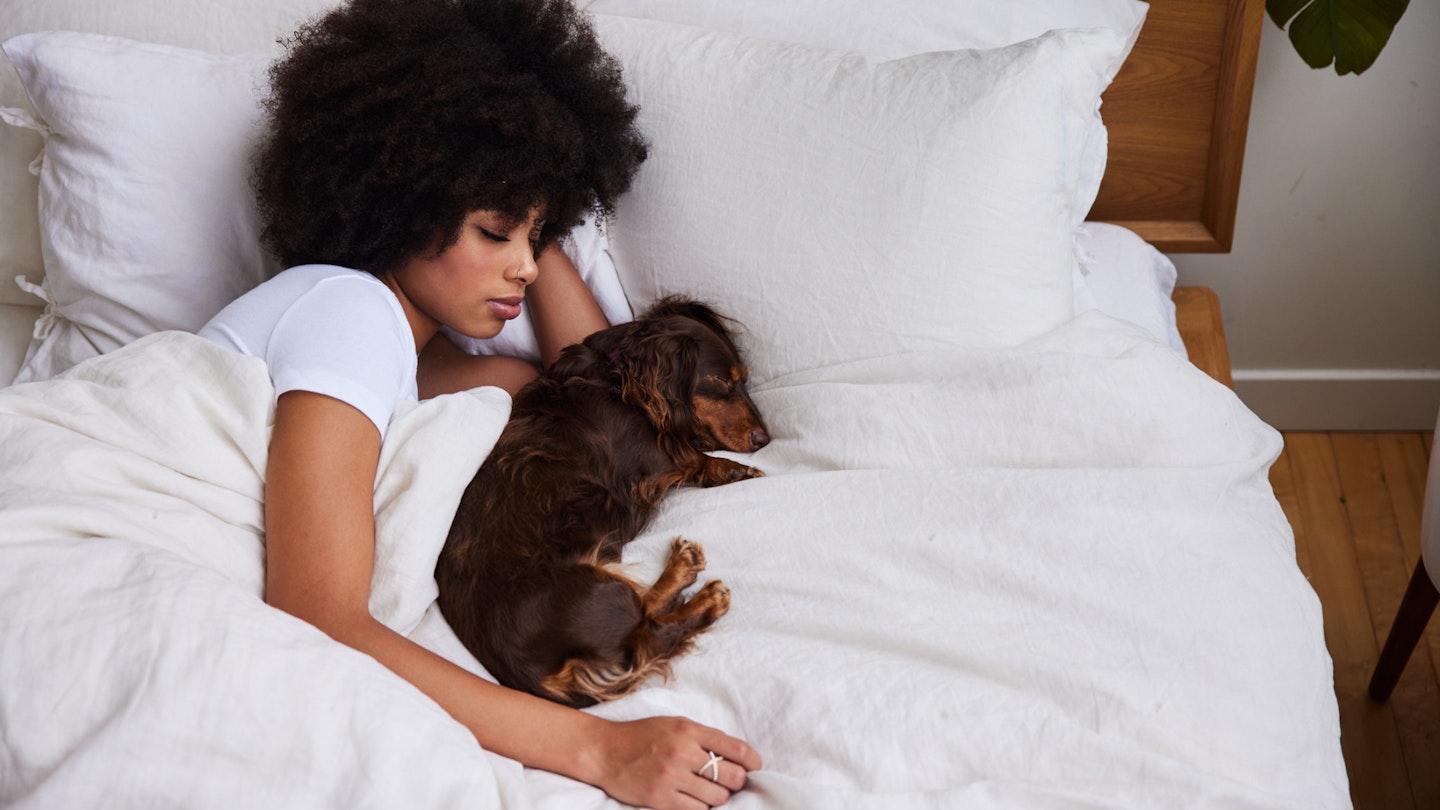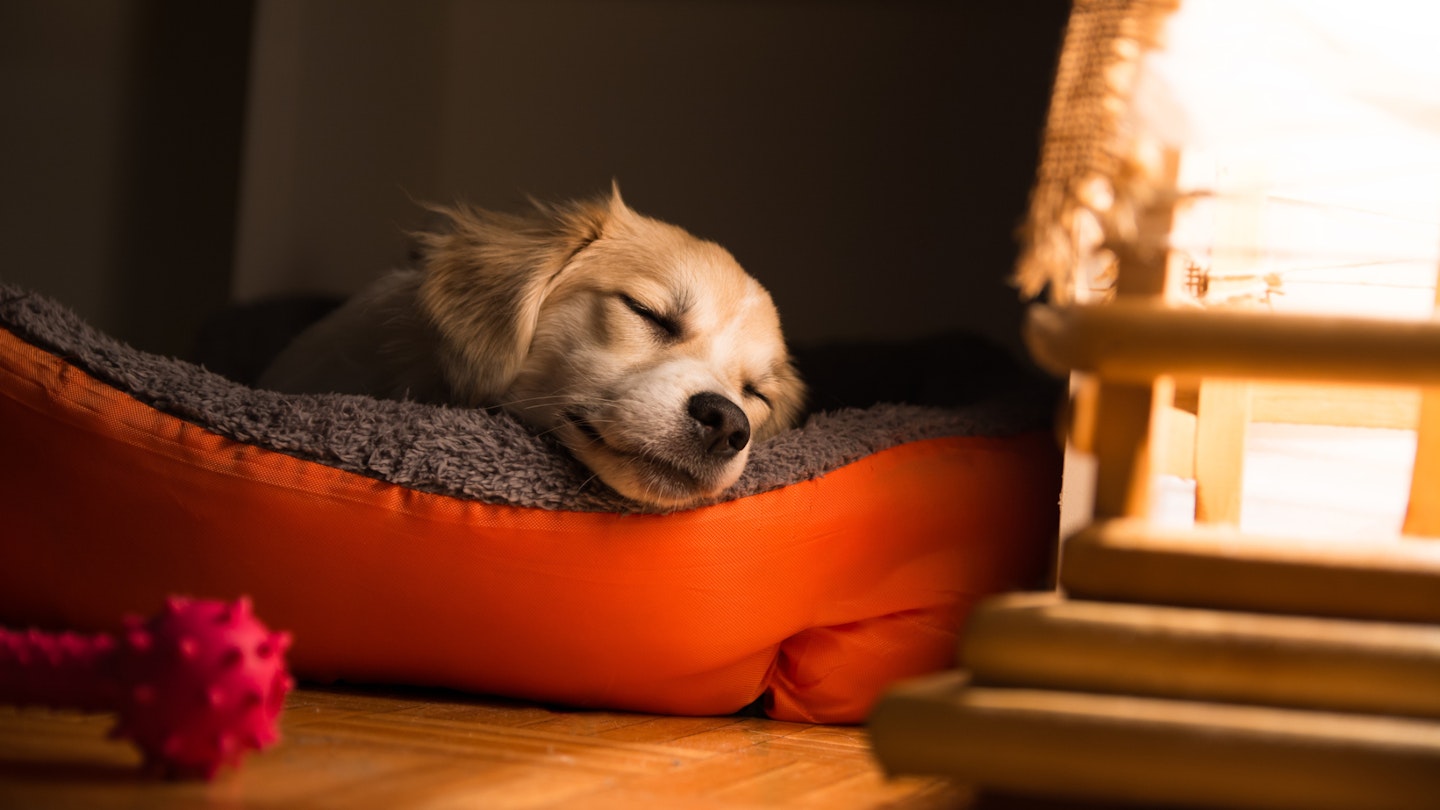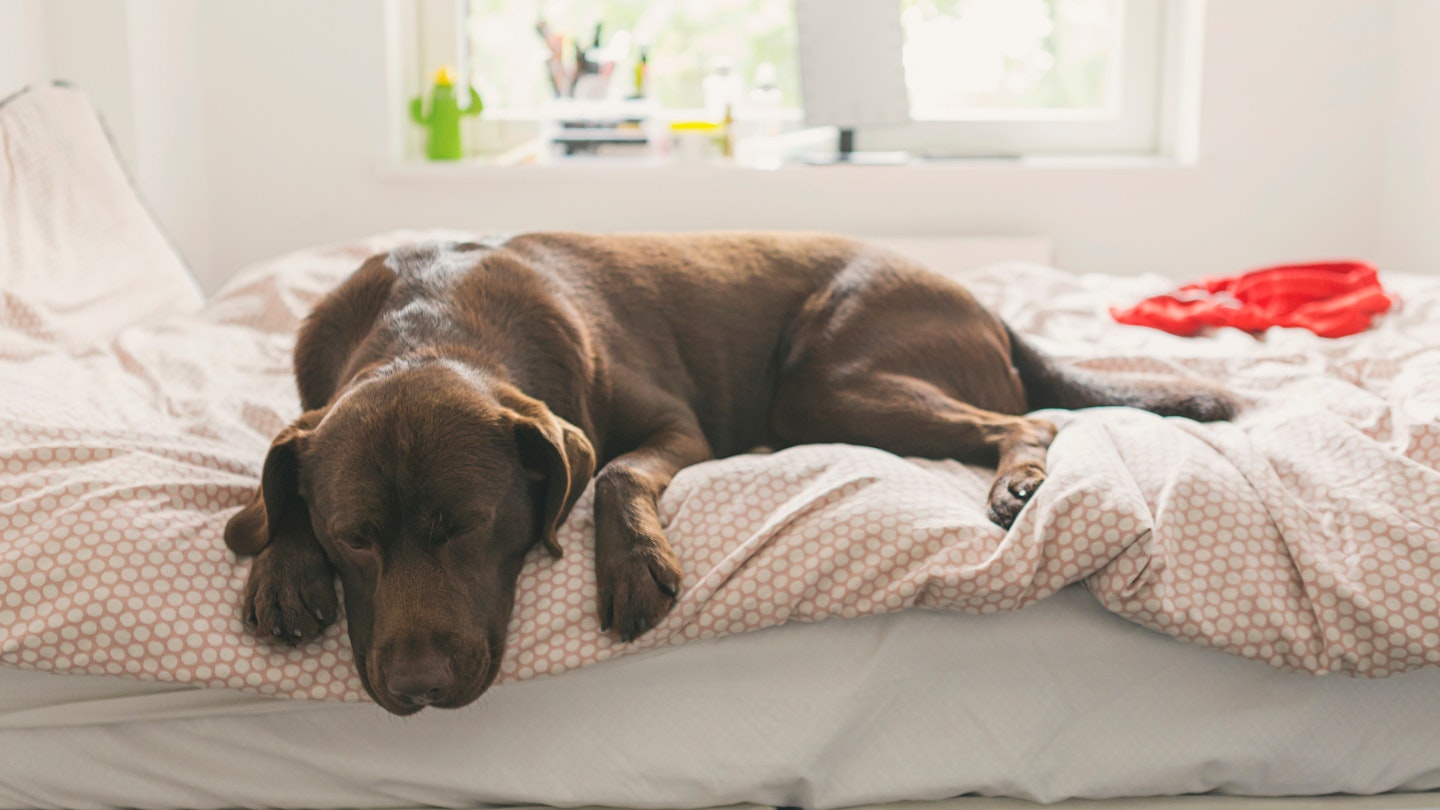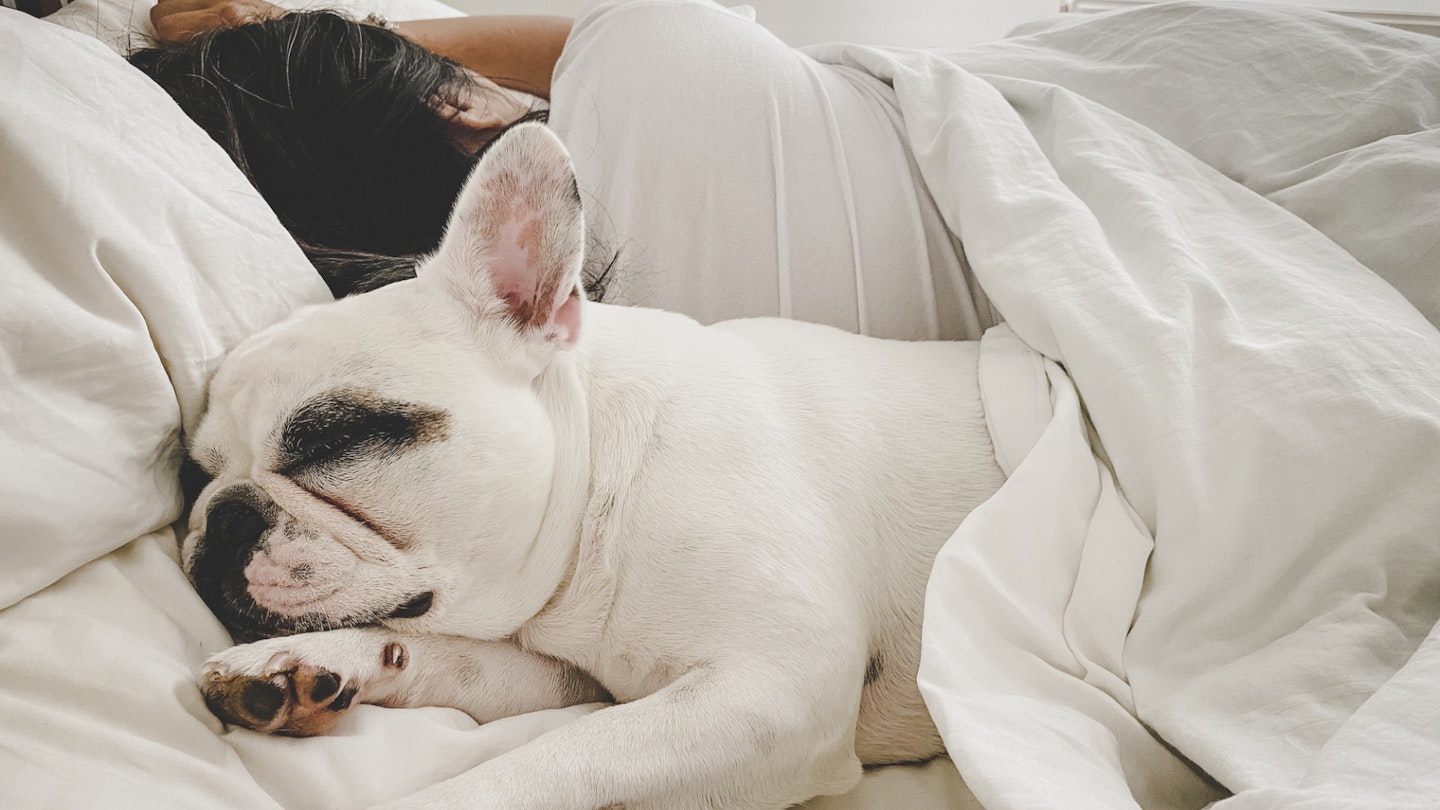Whether you've got a clingy pooch or enjoy the comfort of having your dog by your side, there are a lot of opinions about whether you should let your dog sleep in your bed. A recent survey found that almost half of UK dog owners (48%) opt to share their beds with their canine companions, citing comfort and safety as key reasons to keep them close. Meanwhile, others stand firm on their pups staying in their dedicated dog bed.
In collaboration with renowned animal behaviourist Professor Peter Neville, sleep tech firm Simba delves into the age-old debate of co-sleeping with canines to unravel the pros and cons. They examined the co-sleeping habits of over 1,000 UK dog owners, focusing on the top 20 most popular breeds. Brace yourself for the surprising revelations behind our furry bedfellows and the dos and don'ts for ensuring both pet and owner get a good night's rest.
Should I let my dog sleep in my bed?
Ultimately, it's up to you. Despite strong opinions from each side of the argument, there's no right or wrong answer - all that matters is doing what's best for you and your pet. If you're still unsure, weighing up the pros and cons may help you come to your own conclusion, along with breed characteristics further below.
Lisa Artis, deputy CEO at The Sleep Charity, sleep tech firm Simba’s charity partner, said “The NHS recommends we get seven to nine hours of sleep each night, which we may struggle to achieve when co-sleeping with our dogs, however, the benefits they provide may outweigh any nocturnal interruptions.
“While their noises and movements can disrupt our slumber, the sense of safety, companionship, and happiness they bring can be worth it. So although we wouldn't actively endorse dogs sleeping on our beds, it's clear how much they can contribute to our overall wellbeing and mental health.”

Other reasons Brits choose to sleep with their dogs include:
• 54% said they want their dogs to be comfortable
• 51% said they like their dog to be close
• 35% said it reduces stress
• 33% said it makes them feel safe
• 33% said their dog keeps them warm
• 28% said it improved their mental wellbeing
• 22% said it helped to ease loneliness
However, it's worth considering that this could lead to:
• Disrupted sleep
• Risk of injury from dog sleep reactivity
• Increased exposure to bugs, parasites and allergies
• Co-dependency
• Difficulty establishing boundaries and dominance over your pet
Regardless, it's important to establish a routine and a strong relationship with your pooch first before inviting them into bed. If they get separation anxiety, for example, having them sleep in bed with you may increase their dependency on you and make it harder to leave them home alone.
Likewise, if you have a healthy working relationship, your pup will happily share your bed. But a bossier and boisterous dog will need to have its behaviours worked on before entering a bed setting. A dog that's disrespectful elsewhere in the home will likely take ownership of the bed and make sleeping more of an issue.
If you'd like to keep your dog close without letting them into your bed, try having them as a roomie instead.
Lisa Artis adds: “You could consider having your dog sleep in the room in their own bed, or giving them a dedicated space on the bed where they sleep. Equally, it may be beneficial to invest in a mattress that’s big enough to share! At the end of the day, it comes down to common sense. If your dog is disturbing your sleep, it’s time to move them off the bed!”

Dos and don'ts to sharing your bed with your dog
So, you've decided that you will sleep alongside your pup? Professor Peter Neville shares his top six dos and don'ts to sleeping with your dog to help you both to have a optimal sleep:
Do keep the room cool
Your adorable furry friend comes equipped with a natural fur coat to keep them cosy in chilly weather, but it also means they can get quite warm in hotter temperatures - potentially more so in a snug bed and with your own body heat radiating nearby.
Just like us, dogs find it hard to catch some Zs when the bedroom is too warm. Consider turning down the heat, opening a window if it's safe, or using a fan or air conditioner to maintain a comfortable temperature. And for those extra toasty nights, a lighter or temperature-friendly duvet could be a great solution.
Do your best to tire your pooch out before bedtime
Simba's study findings suggest that our four-legged pals can be quite active at night, but fear not - there's a simple trick to ensure both you and your furry friend enjoy a better night's sleep: wear them out before bedtime.
Consider taking your dog for a relaxing evening jog or a leisurely stroll to help them unwind. Alternatively, a brief 10-15 minute play session with chase or tug toys can do wonders.
Just like us, dogs can benefit from a soothing bedtime routine that signals it's time to wind down. After your exercise or playtime, indulge them in some quiet cuddles and grooming to prepare them for a restful night.
Don't feed them or give them too much water before bed
Just like us, our loyal companions might face some discomfort and a flurry of bathroom trips if they indulge in a late-night feast or excessive drinks before bedtime. So, steer clear of serving your furry friend a big meal in the evening or letting them guzzle down too much water.
Think about shifting their last mealtime to earlier in the day, maybe around mid-afternoon, and ease up on dog water bowl access a few hours before bedtime.

Do keep your canine zen to catch some zzz's
About half an hour before hitting the hay, give your hound some space and ignore their attempts to keep playing. You don't want them bouncing off the walls when you're trying to drift off to the land of nod.
Ease them into relaxation with calming strokes and brushing to get them ready for sleep. And once you're all tucked in, keep those cosy cuddles coming, so you both can drift into dreamland in the most comfortable sleeping position possible.
Do keep your bed clean and cosy for you and your furry friend
Let's face it, our furry friends can bring some serious dirt and germs into the house from their outdoor adventures. So, to help you both have a comfortable and healthy sleep, make sure to wash and change your bed sheets regularly, washing them on a high heat to kill off any unwanted bacteria.
Do get a bed as big as possible
When sharing a bed with your pooch, the bigger the bed, the better. The study found that only 17% said they sleep with their dog and their partner in the bed, no doubt due to the lack of wiggle room.
With a larger bed, your pooch can sprawl out in style so you can all drift off in peace without anyone being pushed out.
Best dog breeds to bed share with
Simba's study also shed light on the best (and worst) breeds to bed share with for a good night's rest. While your dog's temperament and characteristics will be unique to them, some factors like genetics will mean certain breeds are just naturally better bedfellows than others.

Coming in as the top dog (literally!) for a restful sleep was the faithful Labrador Retriever. According to the study, Labrador owners are less likely to experience insomnia, sleep apnea, or snoring. These four-legged friends snooze soundly, allowing their owners to average more sleep than any other breed surveyed - at six hours a night.
Professor Peter Neville explains, "Labrador Retrievers have an uncanny ability to understand what pleases their human companions. They quickly learn the art of stillness, only breaking it when guarding the home. With their easy trainability and adaptability to our activity and rest cycles, Labradors yearn to spend as much time as possible with us, including snoozing by our side all night long."
Renowned for their playfulness and natural inclination to stay close, Dachshunds take the second place spot.
Professor Neville reveals, "Dachshunds, like Terriers, have an affinity for burrowing into dark spaces—a trait embedded in their genes from their vermin-hunting lineage. But they have adapted to become expert pocket-sized hot water bottles, perfect for chilly UK nights.
"Just be careful, as their fearlessness in the dark might lead them to claim the entire bed, especially if the heating is switched off."
Other best breeds for a restful night include Border Terriers, Pomeranians, and Cocker Spaniels.
Worst dog breeds to bed share with
On the flip side, we encounter a known 'velcro dog' of the canine world - Hungarian Vizslas - found at the bottom of the ranking.
The report found that these affectionate companions, bring their owners the highest levels of sleep apnea, teeth grinding, and twitchy legs at night. What’s more, pet parents to the breed average just under five hours of sleep per night, thanks to their lively and always-ready-for-action four-legged friends.

Professor Neville explains, "Hungarian Vizslas were bred as hunting companions, designed to work and run tirelessly throughout the day. Many owners, drawn to their vibrant personalities and stunning golden-rust looks, struggle to meet their behavioural needs and help them expend their energy during daylight hours.
“Consequently, Vizslas often remain eager and restless come bedtime, anticipating the adventures of tomorrow or dreaming about the excitement of the day gone by."
Not far from the bottom, you'll also find the German Pointer, the energetic, playful and energetic pooch that researchers found was more prone to wriggling around at night - more so than any other breed.
Other breeds likely to disturb your slumber include Bull Terriers, Whippets and Boxers thanks to snoring and frequent passing of wind.
Eleanor Weaver is the Deputy Homes & Garden Product Editor for Take A Break Pets, specialising in small pets. Having been a pet-parent to bunnies and hamsters, she knows just how to care for these little fluffs as well as making sure pets of all sizes are happy and healthy.
